Data privacy has evolved from an obscure issue to a global concern. As a result, governments and companies are pushing to create robust data privacy measures. Yet, about 75% of people claimed to have lost control of how organizations use their data.
The sections below shall shed light on crucial details and statistics behind data privacy and protection globally, discussing the following topics:
Want Faster, Safer, More Actionable Root Cause Analysis?
With Edge Delta’s out-of-the-box AI agent for SRE, teams get clearer context on the alerts that matter and more confidence in the overall health and performance of their apps.
Learn More- State of Data Privacy Laws Globally
- Data Privacy Awareness
- Consumer Behavior on Data Privacy
Editor’s Choice
- In 2024, there are 138 countries with data and consumer privacy laws.
- 26% of US states have enacted data privacy laws in 2024.
- The European Union (EU) has fined the 5 most popular social media sites over $3.1 billion in 2023 over data privacy violations.
- In 2014, Cambridge Analytica illegally acquired the private data of over 87 million Facebook users.
- 71% of US adults are worried about how their government uses their personal data in 2023.
- 70% of US and UK organizations have designated internal officers to lead and implement data privacy measures.
- As of 2023, about 46% of consumers worldwide are aware of their country’s data privacy laws.
- In 2022, 21% of consumers stated that companies will become more trustworthy if they stop selling a person’s data.
- 51% of consumers worldwide used the privacy mode on browsers in 2022.
The Statistics and Facts Behind Data Privacy Worldwide
Rules and regulations for data privacy require complex and extensive approaches worldwide. This is because each country and state has varying perspectives on the issue.
Around 71% (138) of countries have enacted data privacy laws in 2023. While a few countries have recently initiated to create laws, others have yet to address data privacy issues, as shown below:
- 15% (29 countries) have no legislation on data privacy
- 9% (17 countries) have drafted laws on data privacy
- 5% (10 countries) don’t have available data regarding data privacy legislation
Sweden was the country that initiated data privacy regulations on a national level with its Data Act 1973. On the other hand, India was the latest to enact data privacy legislation with the DPDPA 2023.
The sections below discuss key figures and details about global data protection and privacy legislation, exploring how each region treats data privacy issues in 2024.
The State of Data Privacy and Protection Laws Globally
The data privacy landscape worldwide continues to flourish, highlighting the increased prioritization of the value of data protection. More regions aim to provide strict measures against data misuse.
The trend shows a global move towards harmonizing data management standards, as highlighted in the statistics and facts below.
1. As of 2024, only 10% of US states have enacted comprehensive data privacy laws.
(White Case, Osano)
13 out of 50 US states (26%) have issued comprehensive data privacy and protection laws as of February 2024, namely:
| Enacted | Pending |
|---|---|
| 1. California (CCPA/CPRA) | 1. Texas (TDPSA) |
| 2. Colorado (CPA) | 2. Oregon (OCPA) |
| 3. Connecticut (CTDPA) | 3. Montana (MTCDPA) |
| 4. Virginia (VCDPA) | 4. Delaware (DPDPA) |
| 5. Utah (UCPA) | 5. Iowa (ICDPA) |
| 6. New Jersey (NJDPA) | 6. Tennessee (TIPA) |
| 7. Indiana (INCDPA) |
California’s “Privacy Rights Act (CPRA)” is the most extensive data privacy law in the US. The law factors in several key aspects such as thresholds, consumer rights, and sensitive data.
2. Five data privacy and protection laws will apply to international data management issues in 2024.
(Netwrix, GDPR, Comforte)
5 out of 138 data privacy laws worldwide affect organizations that manage the data of any resident of the originating country. Studies have suggested that the GDPR is the most robust law covering data privacy in the world due to massive fines and stringent provisions. The five international privacy laws include:
- EU’s General Data Protection Regulation (GDPR)
- Brazil’s General Data Protection Law (GDPL)
- China’s Personal Information Protection Law (PIPL)
- California’s Consumer Privacy Act (CPRA)
- Australia’s Privacy Act 1988
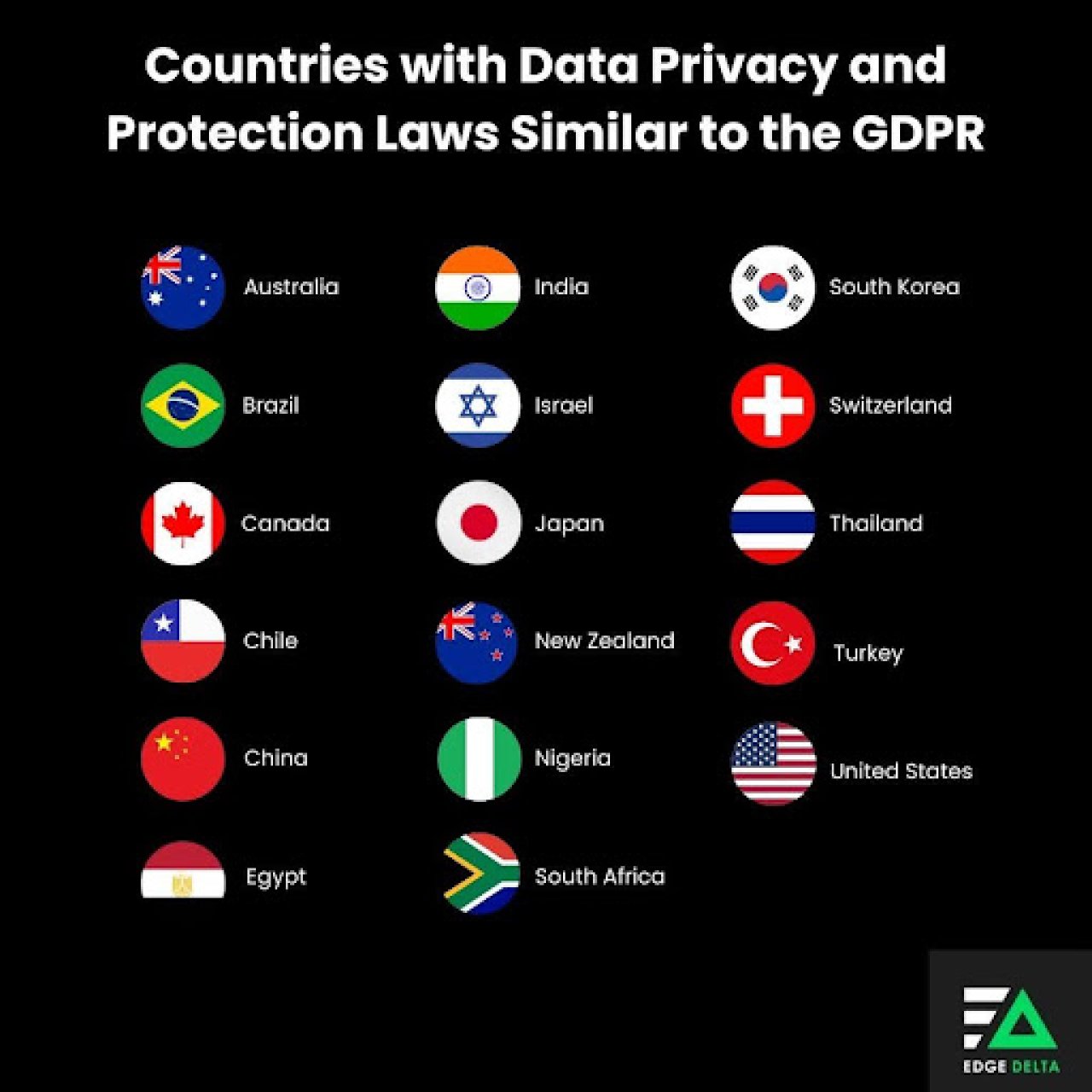
17 worldwide countries have international data privacy laws (enacted or pending) that adopted the GDPR. These regulations cover consent, purpose limitation, data minimization, and individual rights.
3. The GDPR has fined the top 5 social networking sites over $3.1 billion in 2023 over violations.
(Cybernews, Surfshark, Business Insider)
In 2023, the EU imposed massive fines of over $3.1 billion on the 5 most popular social media platforms through its GDPR. Around 30% of the total covers the sites’ mishandling of children’s sensitive data.
Below are the 5 sites fined by the EU, through its GDPR:
- Facebook – $1.8 billion
- Instagram – $624 million
- TikTok – $384 million
- WhatsApp – $246 million
- X (Twitter) – $480,000
Mark Zuckerberg, CEO of Meta, owns 3 of the 5 penalized sites—Facebook, Instagram, and WhatsApp. The CEO is infamous for being involved in multiple lawsuits due to data privacy violations.
Fun Fact:
The world celebrates “Data Privacy Day” every January 28th. The event was introduced in 2006 by the Council of Europe to raise awareness and advocate for proper data protection measures.
Many countries worldwide observe Data Privacy Day, including the US, Canada, Philippines, Qatar, Israel, Nigeria, and around 47 European countries.
Data Privacy Awareness Statistics
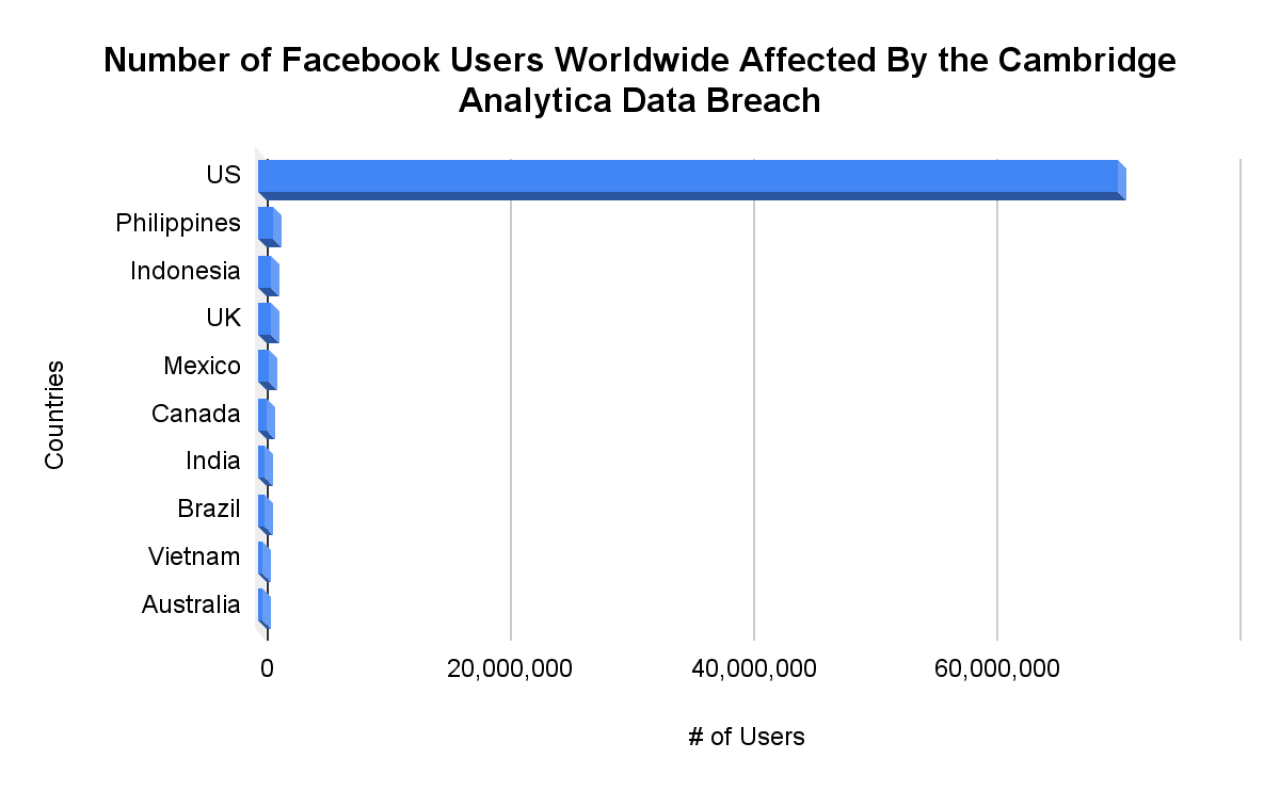
In March 2018, alarming reports about data breaches showed how crucial data privacy truly was when a former data firm employee exposed how the sensitive data of over 87 million Facebook users was illegally obtained.
The “Facebook-Cambridge Analytica Scandal” woke the world up to the urgent need for robust and secure data privacy regulations and programs to teach data privacy awareness and protection.
2020 saw around 10 countries add to the list of regions that have passed legislation on data protection and privacy, influenced by the GDPR and the data breach issues.
The statistics below explore important details about the growth and trends behind worldwide awareness of data privacy issues in 2024.
4. Around 28% of internet users worldwide exercised their DSAR rights in 2023.
(Forbes, Statista)
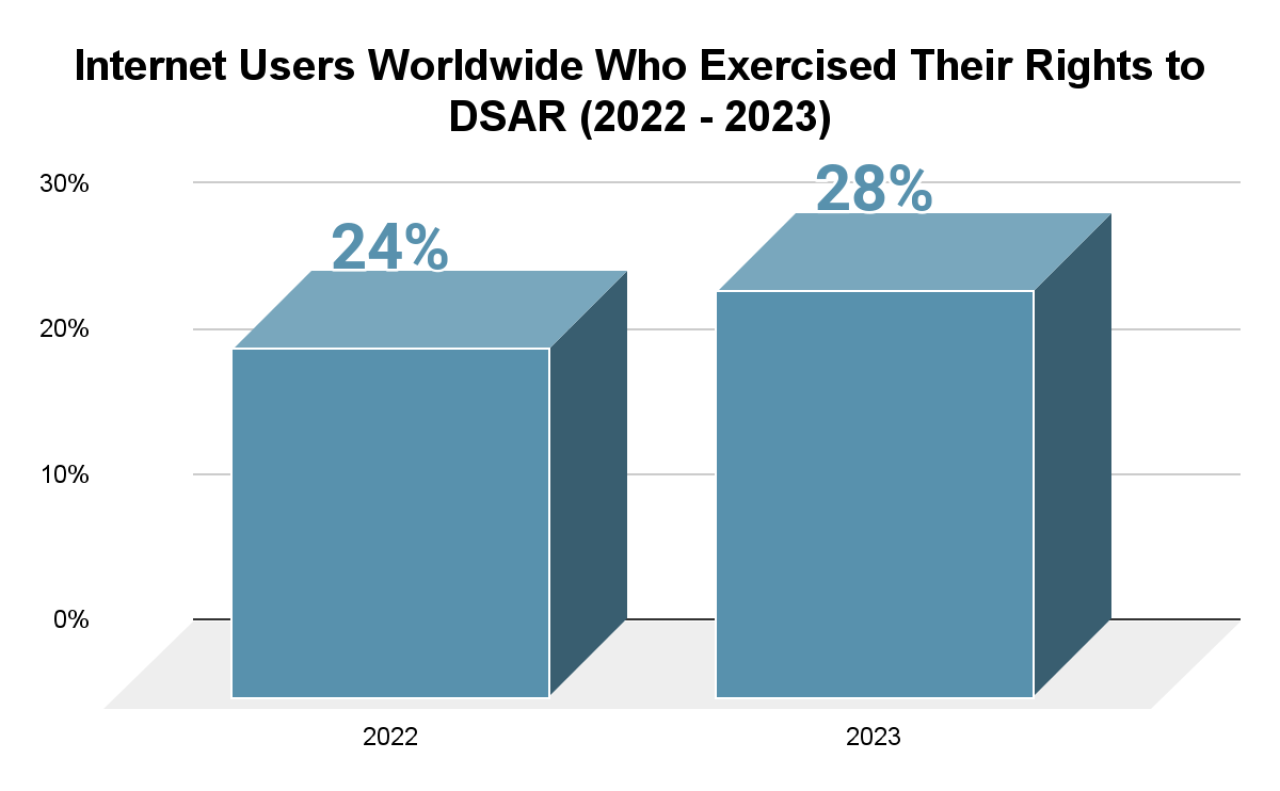
With the rise of data privacy issues, so does the users’ awareness regarding data privacy rights. In 2023, approximately 28% of consumers have applied their Data Subject Access Rights (DSAR), a 4% rise from 2022.
Companies like Apple have contributed to users’ growing data privacy awareness by giving users control over how their data is treated. These companies provide features that let users manage access to their libraries and control how apps monitor their data.
Alarming Fact:
Weak passwords are the leading cause of data breaches. 45% of internet users re-use their passwords for multiple accounts, creating weak and easy-to-hack passwords.
Data analysts have discouraged users from using 12345, their birth dates, and family name members as passwords to reduce the possibility of data loss.
5. In 2023, 71% of US adults expressed concerns with how their government managed their data.
(Pew Research Center)
US citizens have become more aware of how their government treats their data. In 2023, 71% of American adults were worried about how the government uses their data, a 7% growth from 2019.
The study also shows that 77% of Republicans are concerned about how the government uses their data, while only 65% of Democrats feel the same.
According to the same research, 67% of US citizens are unaware of what companies do with their data. 73% believe they have little to no control over what companies do with their data.
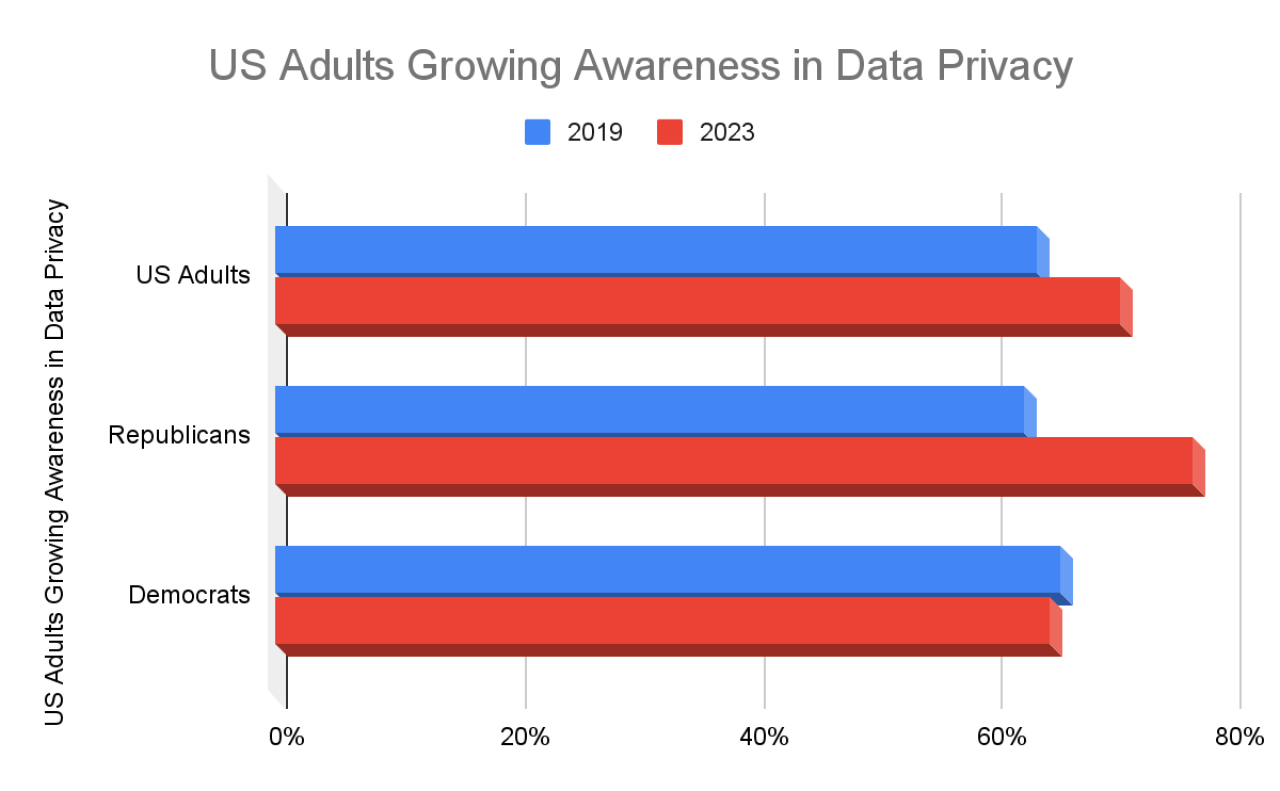
6. Approximately 5% of US and UK organizations have considered conducting staff training programs on data privacy and compliance in 2023.
(Statista)
Studies on data privacy measures among US and UK organizations showed that 70% have designated internal officers to lead and implement data privacy measures. Around 58% of those organizations have also conducted regular training programs on data privacy and compliance with their staff while only 3% have yet to plan for it.
The details above show how aware most US and UK organizations are of data privacy and how much these entities prioritize data protection.
7. Only 18% of US adults claim not to click “Agree” without reading a website’s privacy policy.
(Pew Research Center)
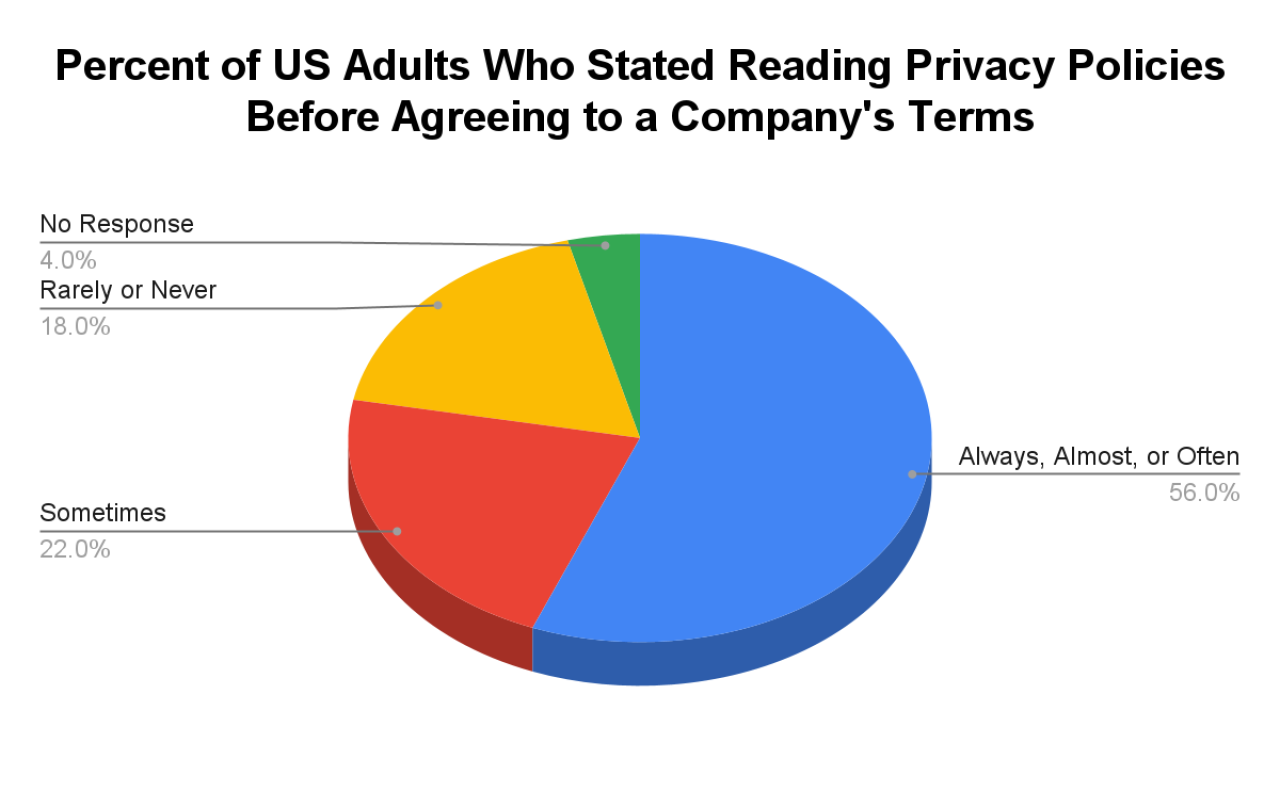
Over half of US adults (56%) always click “Agree” without reading a company’s Terms and Conditions and privacy policies. These policies contain vital provisions that let users know what the sites do to their data.
8. As of 2023, an average of 46% of internet users globally are aware of their country’s data privacy laws.
(Statista, Meity, AG)
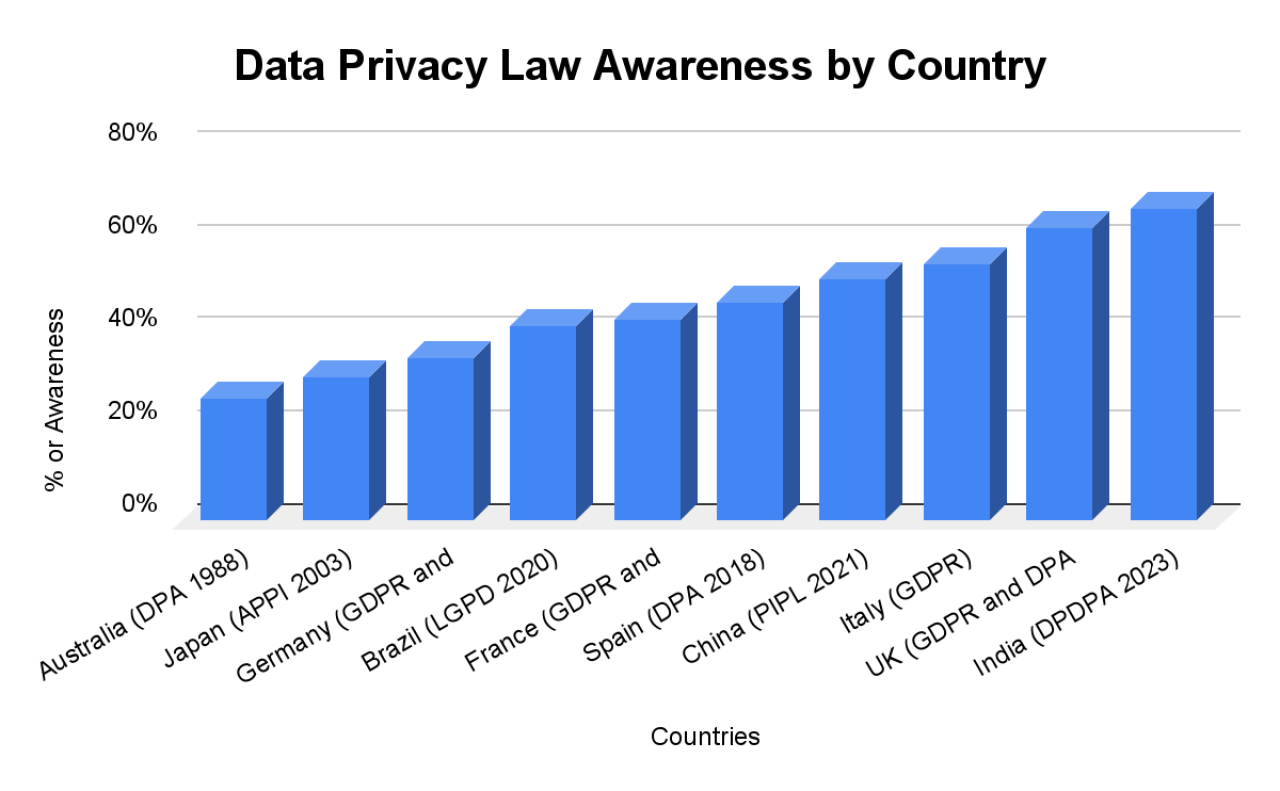
Around 67% of India’s internet users are aware of their country’s data privacy law, the highest rate worldwide. India’s Digital Personal Data Protection Act (DPDPA) was enacted in August 2023, adopting the EU’s GDPR.
Meanwhile, Australia fell at the bottom of the list, with only 26% of the country’s internet user population being aware of their data privacy law (Privacy Act of 1988).
Statistics on Consumer Behavior on Data Privacy in 2024
Consumer awareness of data privacy is growing worldwide. People have become more wary and concerned about how companies and websites treat, manage, and store their sensitive data.
13 US states have signed consumer privacy laws as of January 2024, 9 of which are currently active. These legislations address how businesses should handle a user’s data while promoting consumer protection.
Alarming Fact:
77% of companies operate without a CyberSecurity Incident Response Plan (CSIRP).
Let’s explore the essential facts and figures behind consumer behavior on data privacy and protection, highlighting the perspectives of consumers worldwide on data privacy.
9. Only 7% of consumers considered data privacy and security necessary when deciding which smartphone to purchase in 2021.
(Deloitte)
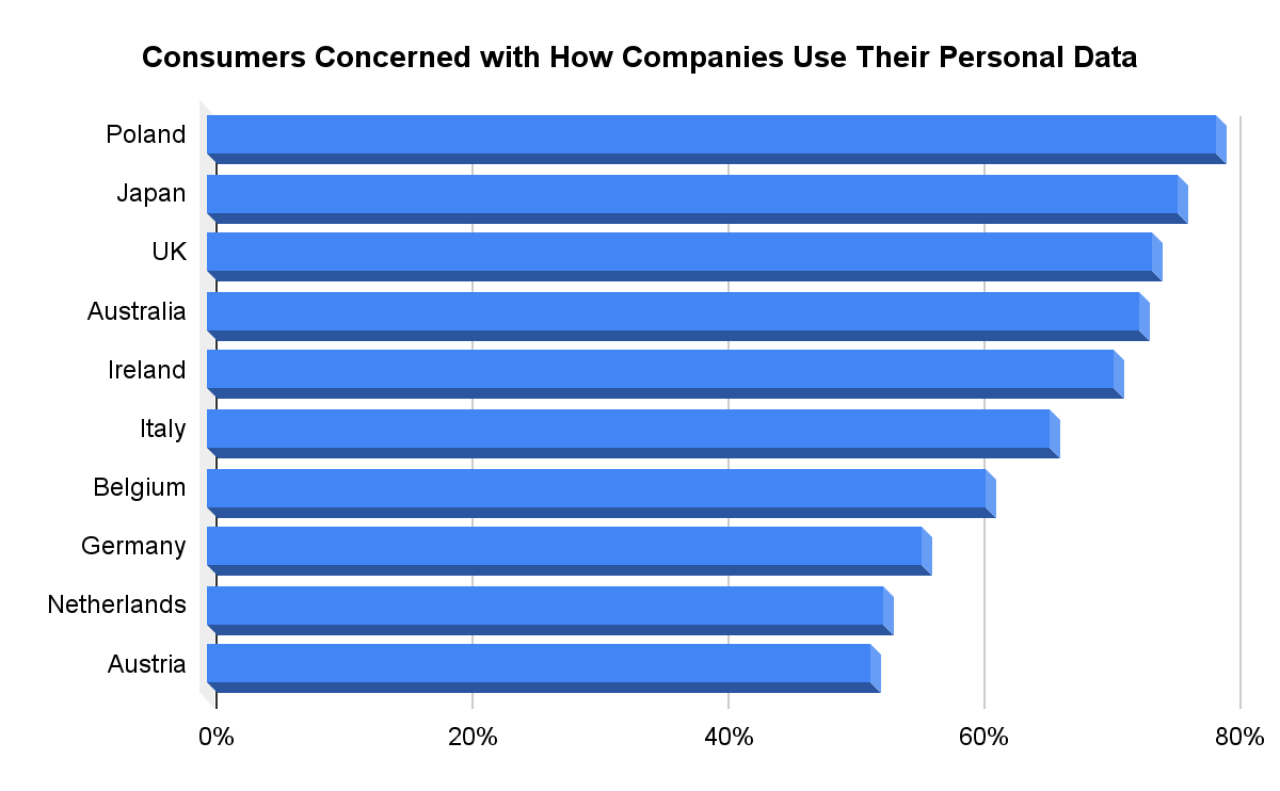
In markets under the EU’s GDPR, consumers can manage cookies and data privacy access. However, the commonly reported action from around 6.75% of consumers is to click on the default cookie settings. The study illustrated above contrasted the numbers by stating that an average of 66% of online consumers worldwide were concerned about how companies they interact with use their data.
10. In 2022, approximately 20% of global consumers believe that companies complying with all privacy laws would build user trust.
(Statista)
Companies worldwide prioritize building trust and confidence with their consumers, especially regarding data privacy and management. 39% of consumers believe transparency on how their data is used would help the company establish trust. In comparison, 21% stated that organizations will become more trustworthy if they refrain from selling consumer data.
11. 22% of internet users were comfortable providing a picture of themselves to receive a better service from companies in 2022.
(Statista)
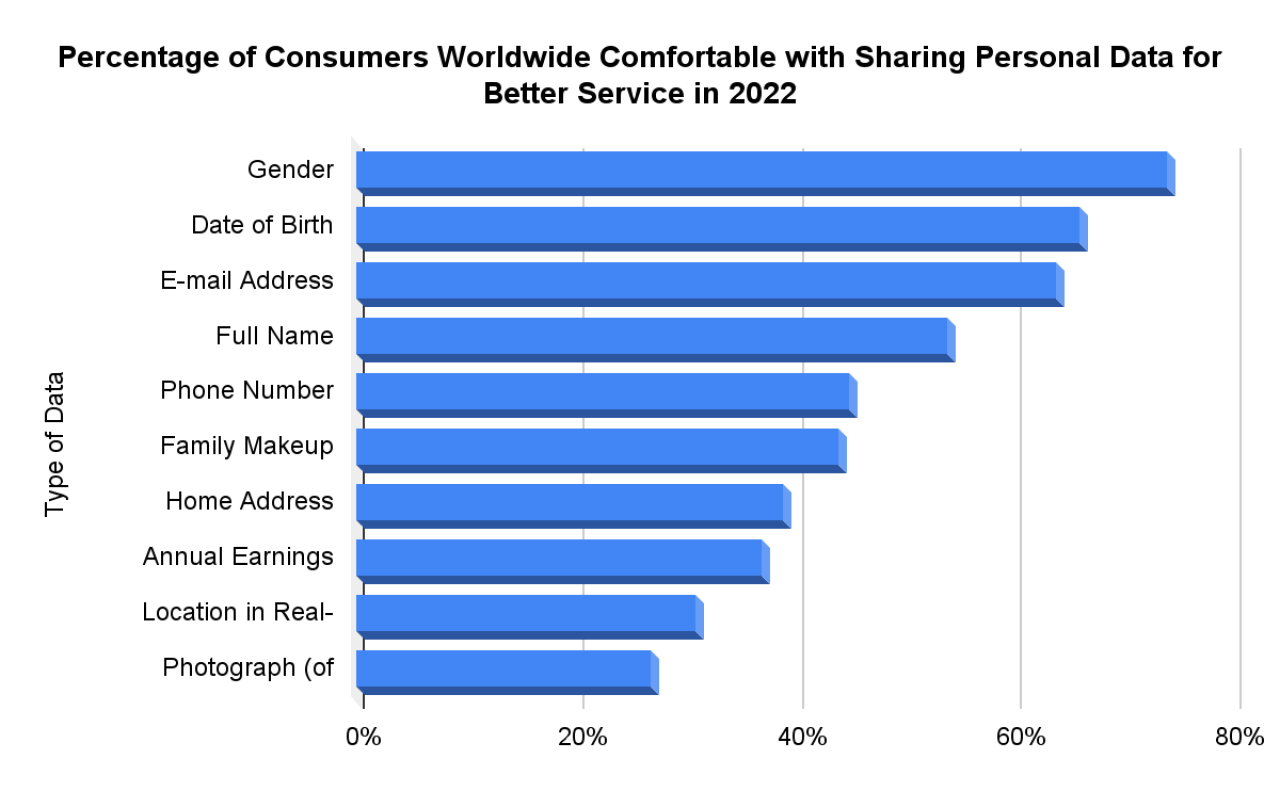
Almost three-quarters (74%) of consumers worldwide stated that they were comfortable with sharing their gender information with companies for the perspective of getting a better service. In comparison, 66% were okay with sharing birth dates.
The numbers above highlight how consumers are unwilling to provide more sensitive information to companies to receive better services and treatment from organizations.
Final Thoughts
The world is quickly becoming aware of the importance of proper data management, as more and more country governments are working towards creating resilient data privacy and protection legislation.
While it took a global scandal involving some of the top companies and personalities worldwide to expose the world to the importance of data protection, most took immediate action to address the issue. The statistics highlight the world’s awareness of the potential threats and consequences of data misuse and how crucial it is for governments, organizations, and individuals to act swiftly.
FAQs on Data Privacy Statistics in 2024
How many people are concerned about privacy?
In 2023, 81% of users are concerned about how companies use their data, and 71% are worried about how the government treats their data.
What are the data privacy concerns in 2023?
The major data privacy concerns in 2023 include data exploitation, identification and tracking, data breach risks, and managing vulnerable people’s data.
How is data privacy a problem?
A person/organization’s data can be misused if not privately kept private or if people cannot control how their information is treated.
List of Sources:
- World Population Review
- Scandinavian Law
- User Centrics
- White Case
- Osano
- Netwrix
- GDPR
- Comforte
- Cybernews
- Surfshark
- Business Insider
- CNBC
- NY Times
- Forbes
- Statista
- Pew Research Center
- Pew Research Center
- Statista
- Statista
- Meity
- AG
- Osano
- Deloitte
- Statista
- Tableau
- Statista
- Statista








